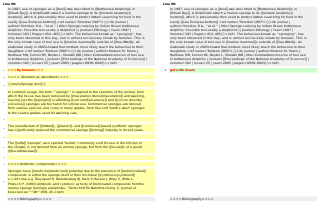
In Internet slang, a troll is a person who starts flame wars or intentionally upsets people on the Internet by posting inflammatory and digressive, extraneous, or off-topic messages in an online community with the intent of provoking readers into displaying emotional responses and normalizing tangential discussion, either for the troll's amusement or a specific gain.
A pseudonym or alias is a fictitious name that a person or group assumes for a particular purpose, which differs from their original or true name (orthonym). This also differs from a new name that entirely or legally replaces an individual's own. The pseudonym identifies one or more persons who have true names but do not publicly disclose them. Most pseudonym holders use pseudonyms because they wish to remain anonymous, but anonymity is difficult to achieve and often fraught with legal issues. True anonymity requires unlinkability, such that an attacker's examination of the pseudonym holder's message provides no new information about the holder's true name.
A shill, also called a plant or a stooge, is a person who publicly helps or gives credibility to a person or organization without disclosing that they have a close relationship with the person or organization. Shills can carry out their operations in the areas of media, journalism, marketing, politics, confidence games, or other business areas. A shill may also act to discredit opponents or critics of the person or organization in which they have a vested interest through character assassination or other means.

An Internet forum, or message board, is an online discussion site where people can hold conversations in the form of posted messages. They differ from chat rooms in that messages are often longer than one line of text, and are at least temporarily archived. Also, depending on the access level of a user or the forum set-up, a posted message might need to be approved by a moderator before it becomes publicly visible.

A sock puppet is a puppet made from a sock or similar garment. The puppeteer wears the sock on a hand and lower arm as if it were a glove, with the puppet's mouth being formed by the region between the sock's heel and toe, and the puppeteer's thumb acting as the jaw. The arrangement of the fingers forms the shape of a mouth, which is sometimes padded with a hard piece of felt, often with a tongue glued inside.
Comment spam is a term referencing a broad category of spambot or spammer postings which abuse web-based forms to post unsolicited advertisements as comments on forums, blogs, wikis and online guestbooks. Related topics include:

Stephen Leather is a British thriller author whose works are published by Hodder & Stoughton. He has written for television shows such as London's Burning, The Knock, and the BBC's Murder in Mind series. He is one of the top selling Amazon Kindle authors, the second bestselling UK author worldwide on Kindle in 2011.
The web brigades, also known as Russia's troll army, Russian bots, Putinbots, Kremlinbots, troll factory, Lakhta trolls or troll farms, are state-sponsored anonymous Internet political commentators and trolls linked to the Russian government. Participants report that they are organized into teams and groups of commentators that participate in Russian and international political blogs and Internet forums using sockpuppets, social bots and large-scale orchestrated trolling and disinformation campaigns to promote pro-Putin and pro-Russian propaganda. It has also been found that articles on Russian Wikipedia concerning the MH17 crash and the 2014 Ukraine conflict were targeted by Russian internet propaganda outlets.

A puppet is an object, often resembling a human, animal or mythical figure, that is animated or manipulated by a person called a puppeteer. The puppeteer uses movements of their hands, arms, or control devices such as rods or strings to move the body, head, limbs, and in some cases the mouth and eyes of the puppet. The puppeteer often speaks in the voice of the character of the puppet, and then synchronizes the movements of the puppet's mouth with this spoken part. The actions, gestures and spoken parts acted out by the puppeteer with the puppet are typically used in storytelling. Puppetry is a very ancient form of theatre which dates back to the 5th century BC in Ancient Greece. There are many different varieties of puppets, and they are made from a wide range of materials, depending on their form and intended use. They range from very simple in construction and operation to very complex.
A puppet is an inanimate object or representational figure animated by a puppeteer.
Jeremy Duns is a British author of spy fiction and the history of espionage. Born in Manchester, he now resides in the Åland Islands.
A real-name system is a system in which users can register an account on a blog, website or bulletin board system using their legal name.

Wiki-PR is a consulting firm that formerly marketed the ability to edit Wikipedia by "...directly edit[ing] your page using our network of established Wikipedia editors and admin[s]". The company and all of its employees, contractors, and owners, were then banned from editing Wikipedia by the Wikipedia community.
Students of George Mason University, as part of Professor T. Mills Kelly's course – "Lying about the past", have created two popular hoaxes: the "Edward Owens hoax," and the "Reddit serial killer hoax." It is a goal of the course to create a sweeping internet deception. As Prof. Kelly stated in the course's syllabus:
What's our goal? Buzz, of course! Viral! We want our hoax to be picked up and spread around the Internet like wildfire!
Catfishing is a deceptive activity where a person creates a sockpuppet presence or fake identity on a social networking service, usually targeting a specific victim for abuse or fraud. Catfishing is often employed for romance scams on dating websites. The practice may be used for financial gain, to compromise a victim in some way, or simply as forms of trolling or wish fulfillment. Catfishing media has been produced, often featuring victims who wish to identify their catfisher. Celebrities have been targeted, which has brought media attention to catfishing practices.

Joshua Ryne Goldberg is an American terrorist, convicted of attempting a bombing on the 14th anniversary of the September 11 attacks, while posing as an Islamic terrorist affiliated with ISIS.
New Directions for Young Adults, Inc. v. Davis is a 2014 decision of a Florida state circuit court holding that using sock puppet accounts online is tortious interference with business relations, and awarding injunctive relief against it during the pendency of litigation.
People v. Golb is an extensively litigated New York case in which Raphael Golb was convicted for sock puppetry conduct relating to the Dead Sea Scrolls. His conviction was partially reversed on constitutional grounds, but was substantially affirmed.
Internet manipulation refers to the co-optation of digital technology, such as social media algorithms and automated scripts, for commercial, social or political purposes. Such tactics may be employed with the explicit intent to manipulate public opinion, polarise citizens, silence political dissidents, harm corporate or political adversaries, and improve personal or brand reputation. Hackers, hired professionals and private citizens have all been reported to engage in internet manipulation using software – typically Internet bots such as social bots, votebots and clickbots.
Account verification is the process of verifying that a new or existing account is owned and operated by a specified real individual or organization. A number of websites, for example social media websites, offer account verification services. Verified accounts are often visually distinguished by check mark icons or badges next to the names of individuals or organizations.







